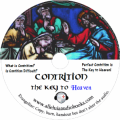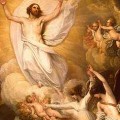Catholic Short Sermon for Advent : St John the Baptist
The angel said to him: Fear not, Zachary, for thy prayer is heard; and thy wife Elizabeth shall bear thee a son, and thou shalt call his name John ; and thou shalt have joy and gladness, and many shall rejoice at his birth. — LUKE 1:13
These words, my brethren, were spoken by the Angel Gabriel to Zachary, the father of St. John the Baptist, while he was engaged with his religious duties in the temple at Jerusalem. Before giving the account of the angel’s visit St. Luke informs us that Zachary and his wife, Elizabeth, were both acceptable to God and obedient to the divine law. There are few who have received such commendation in the pages of Holy Scripture. It might have been surmised that Zachary led a good life, practicing the virtues and avoiding the vices, since he belonged to the Jewish priesthood. Yet we find that his wife, Elizabeth, is mentioned as deserving equal praise with himself, for it is stated that ” they were both just before God, walking in all the commandments and justifications of the Lord without blame.”
Such is the brief account that St. Luke has given of the parents of St. John the Baptist. Though brief, it is enough to show that any son might well feel proud of parents such as they were—blameless in the sight of God. For many years they had lived together in the hill-country of Judea, conscientiously performing their duties, and cherishing the hope that they would be rewarded for their good actions. Like the rest of the Jews who remained faithful to the laws promulgated by Moses and the prophets, which God had made for Israel, they prayed earnestly for the coming of the Messias, the Orient from on high, who was ardently expected to descend from his throne in heaven in order to enlighten those in darkness and in the shadow of death, ‘directing their steps into the way of peace. While serving God by strict fidelity to the commandments, they did not anticipate that an angel would be sent to visit them; they did not know until advanced in age that a son would be born to them who would be called the prophet of the Most High, the precursor of the son of David, appointed to prepare his ways.
That this blessing was unexpected is shown by the fact that Zachary hesitated to believe the message of the Angel Gabriel, and on account of this hesitation, this mistrust of the good tidings that God sent to him, he was deprived of the use of speech for several months. After the birth of St. John the Baptist his tongue was again endowed with the power to speak, and his words on that occasion, spoken under the influence of inspiration, have been preserved in the grand canticle known as the Benedictus, which is justly assigned to a prominent place in the Office of the Church.
These considerations enable us to perceive what sort of a home St. John the Baptist had while he remained with his aged parents. From the knowledge we have of them, there is no reason to think that they were deprived of anything requisite to make their home happy and comfortable. Early in life, however, St. John manifested a peculiar preference for the lonely desert. In a special manner he was sanctified before his birth, and received the gifts of the Holy Ghost in an extraordinary degree. It was not because his fellow-creatures had proved deceptive, nor because sad experience had taught him that the glittering charms of the world are transient and wither into dust, that he resolved to live like a hermit, separated from his relatives. Joyfully he abandoned his family privileges, with all that seems to make life among men pleasant, and went forth among the wild rocks in the mountain solitudes to live alone with God. Why was it that he made such a strange choice? The answer is, that God directed him to leave houses and lands, his home and kindred, and endowed him with the heroism needed for a solitary, penitential life. In obedience to the will of God, acting under the guidance of the Holy Spirit, he practiced unusual mortification. He selected coarse raiment, made of camel’s hair; he used a strange kind of food; he abstained entirely from the use of wine. By deeds of heroic penance, by extraordinary acts of self-denial, combined with the performance of his other duties, he advanced in the way of perfection. During this season of Advent we should invoke his intercession, and strive to remove the obstacles that impede the way of the Lord and the action of His grace in our sanctification.
An Excerpt From :
Priests of the Congregation of St. Paul. Five Minute Sermons for Low Masses on All Sundays of the Year. Vol. 2. [S.l.]: Catholic Publication Society, 1886. Print. starts pg 18-21
Summary
A homily on St John the Baptist, St John the Baptists parents and the events surrounding his birth. His attraction to the desert and to a life of special virtue despite having comfortable surroundings. Plus an exhortation to put aside the things of this world to manfully follow Christ.
You may also like:
- The Desert Fathers: Audiobooks, Sayings, Articles
- Short Catholic Homilies: The Value of Time
- Seek Ye First the Kingdom The Life of St Celestine V: Part 1 A Boy Named Peter
- Text of Short Catholic Homilies : Reverence for the Holy Name of God
- Text of Short Catholic Homilies : The Catholic Home
- Saint Kateri Tekakwitha Part 10: The Penitent
- Saint Kateri Takekwitha: Lily at the Foot of the Cross Part 2






